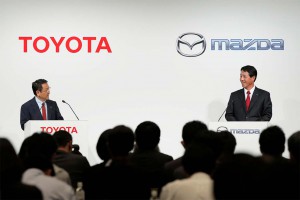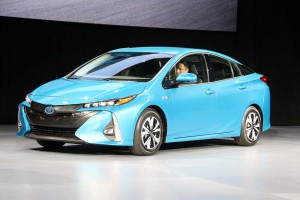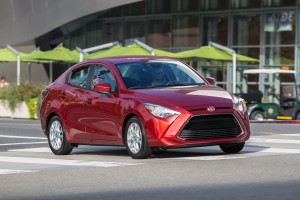On the same day Toyota Motor Corp. announced a 6% jump in net earnings, the Japanese automaker confirmed it will take an equity stake in Mazda Motor Corp. on a venture that will lead them to jointly develop and produce electric vehicles.
Meanwhile, the two carmakers confirmed they will also set up a new, $1.6 billion assembly plant in the United States that will create up to 4,000 new jobs. Toyota already operates a broad network of factories in the U.S., but Mazda hasn’t operated a plant there since exiting a long-running joint venture with Ford Motor Co. several years ago.
“The greatest fruit of our partnership with Mazda is that we have found a new partner who truly loves cars,” said Toyota President Akio Toyoda. “It has also sparked Toyota’s competitive spirit, increasing our sense of not wanting to be bested by Mazda.”
(Toyota steers $5 mil to help launch autonomous vehicle test center in Michigan. Click Here for the story.)
For his part, Mazda President and CEO Masamichi Kogai said, “Nothing would please me more than if, through this alliance, we can help to energize the auto industry and create more car fans by bringing together two competitive spirits to spur each other on, leading to innovations and fostering talent and leaders.”
According to a formal announcement by the two companies, their alliance will be far reaching and will see Toyota acquire a 5% stake in Mazda, the smaller maker taking a stake in its new partner, as well.
Along with the new factory, they will expand an existing product partnership that has Mazda now supplying the bigger Japanese maker with a compact sedan for the North American market. Toyota will began producing a new “two-box van” for sale by Mazda in Japan.
They will also work together on connected car technologies and other advanced safety systems.
But the other big news is the plan for Toyota and Mazda to cooperate on the development and production of new battery technology and battery-based vehicles.
“The industry pace of electrification has really picked up,” said Toyota Chairman Takeshi Uchiyamada, the man widely credited with the development of the popular Toyota Prius hybrid, during an event near Tokyo on Friday.
Toyota has been a pioneer in the hybrid field, and the Prius is the most popular gas-electric model in the world. But the Japanese giant has been, until recently, reluctant to expand into more advanced battery-based technologies, such as plug-ins and pure battery-electric vehicles, instead focusing on hydrogen fuel-cell vehicles such as the Mirai.
That has begun to change, in part, due to the limited hydrogen infrastructure, as well as relatively rapid improvements in both the cost and capabilities of the latest lithium-ion batteries. Toyota, meanwhile, is apparently hoping to bring to market by around 2021 an electric vehicle using an entirely new form of battery, referred to alternately as solid-state and lithium-air. That technology reportedly would further drive down prices, improve range and cut charging times down to something more in line with what it currently takes to fuel up a gas-powered vehicle.
(Click Here for details about Toyota’s potentially revolutionary long-range EV battery.)
It is unclear whether the joint venture with Mazda would focus on vehicles using that new technology or more conventional lithium batteries.
For its part, Mazda has been slow to embrace any form of electrification at all, a shortfall company leaders have acknowledged they must address in the not-too-distant future as global emissions and mileage standards continue to tighten.
Both companies have been seeking out partners to help deal with their internal shortfalls. Mazda, for example, developed an update of its familiar MX-5 Miata in a deal with Fiat Chrysler Automobiles which is marketing its version as the Fiat Spider. Toyota, meanwhile, has purchased truck maker Hino Motors, minicar company Daihatsu and has taken a stake in the parent of the Subaru brand.
The new factory that the two makers will set up at a yet-unannounced U.S. location will be capable of producing 300,000 vehicles a year, that output divided between the two companies. How much each would get is unclear, however.
The factory will “create up to 4,000” U.S. jobs, meanwhile. That is a large number in today’s highly automated automotive manufacturing world, however, and suggests that the two partners intend to produce at least some key EV drivetrain components at the facility – possibly including batteries. The opening of the plant in 2021 would also suggest that the new EVs could use Toyota’s solid-state technology if it is ready by then.
Metal-air batteries are considered the next breakthrough for electric vehicle development and could make such products far more competitive than they are today, even considering the newest long-range models like the Tesla Model 3 and Chevrolet Bolt EV. But how soon they will actually be ready for prime time is far from certain.
Henrik Fisker, an early battery-car pioneer, told TheDetroitBureau.com recently that he is aiming to use such batteries for a new car company he is bringing to market, but said they likely are still “at least five years off.” Elon Musk, the CEO of Tesla, meanwhile, declared that such new battery technology may not even be that close to production yet. But Musk said he would also be quick to embrace any effective alternative to lithium power that proves viable.
If Toyota – and Mazda – actually can bring such batteries to market it could give it a significant marketing advantage over the many other competitors racing to bring batteries to market.
Currently, all forms of “electrified” vehicles account for barely 3% of the global new vehicle market. But some analysts forecast a tenfold jump by the end of the coming decade.
(Brake problem forces big recall for Mazda. Click Here for more.)




Because of the high development cost of autonomous vehicle and battery development we’re likely to see many more joint ventures in the future.